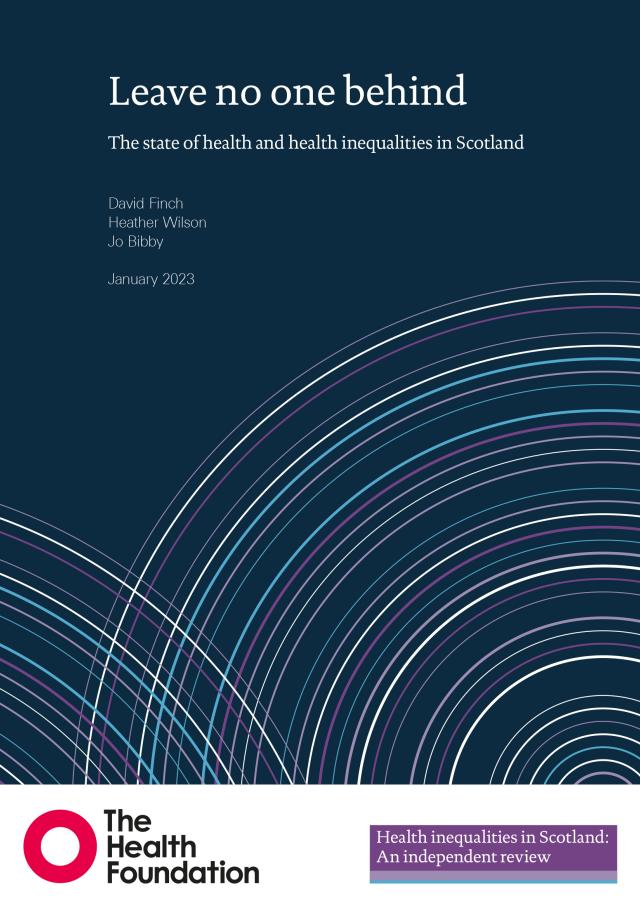Leave no one behind The state of health and health inequalities in Scotland
January 2023

Key points
- How has Scotland fared on health and health inequalities in the two decades since devolution? This report – part of the most comprehensive review of its kind since devolution began – looks at the evidence.
- A healthy population is one of Scotland’s most important assets. It is a vital input into people’s wellbeing and a thriving society and economy.
- This report suggests that progress in building a healthier and fairer nation is possible. But it also highlights that despite undoubted policy ambition, implementation barriers have enabled inequalities to persist. Worse still, they are growing.
- The most glaring predicament revealed by the review is that the health of people living in the most deprived local areas is being left behind the rest of society. The report also identifies three areas of particular concern: the prevalence of drug-related deaths; inequalities in the health and experiences of infants and children; and health and socioeconomic outcomes among young and middle-aged men.
- With a tight fiscal settlement for public services, identifying the barriers to successful policy delivery and enacting reform will be critical to improving Scotland’s future health. Resources do exist but must be used more effectively. Change will require action and collaboration across all parts of the delivery system and from the public.
- For that change to have lasting impact it must be developed and owned by Scotland. Taking action and making progress is possible and can be achieved within existing powers – and by maximising their use – for a healthier and more equal society.
Rooted in Scotland and informed by Scottish experts, this report brings together evidence of trends in health inequalities and wider determinants of health since devolution.
The two decades since devolution in Scotland have seen major external shocks which have changed the underlying social and economic context and created new challenges for tackling health inequalities. These shocks include the 2008 financial crisis and, more recently, the COVID-19 pandemic and alarming rises in the cost of living.
Against this backdrop, the story of Scotland’s health has been mixed. Since the 1950s, Scotland has had the lowest life expectancy of UK nations and in recent decades its position relative to other western European countries has deteriorated. Inequalities in life expectancy between people living in the most and least deprived areas widened in the years prior to the pandemic – with the gap growing to 13.3 years for men, and to 9.8 years for women by 2017–19.
This report provides a picture of past and present health and inequalities to inform future efforts to improve both. It draws on perceptions of the barriers to progress from relevant stakeholders and concludes by considering how Scotland can build on strong policy intent to reduce stubbornly high inequalities and close the gap in health outcomes.
The scale of health inequalities in Scotland is not inevitable. The pandemic demonstrated that agility in policy delivery and local practice is possible and the need to act at pace presents an opportunity for change and renewal. Yet for that change to have lasting impact it must be developed and owned by Scotland. Taking action and making progress is possible and can be achieved within existing powers, and by maximising their use. For Scotland, the human and economic cost of inaction is simply too high.
Further reading
Work with us
We look for talented and passionate individuals as everyone at the Health Foundation has an important role to play.
View current vacanciesThe Q community
Q is an initiative connecting people with improvement expertise across the UK.
Find out more

